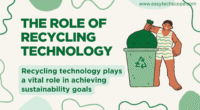Green technology, often called green tech or clean technology, is revolutionizing the way we live, work, and interact with our environment. It combines sustainability with innovation, focusing on reducing carbon emissions, conserving resources, and creating a healthier planet for future generations. As climate change accelerates, the role of green tech is no longer optional—it’s essential.
What is Green Tech?
Green tech refers to the use of science and innovation to create eco-friendly solutions that minimize environmental harm. Unlike traditional technologies that often deplete resources, green tech prioritizes renewable energy, energy efficiency, waste reduction, and sustainable practices. Its goal is to balance human progress with the preservation of nature.
Examples include solar panels, wind turbines, electric vehicles (EVs), biodegradable materials, and smart energy systems. Each of these innovations not only reduces environmental impact but also provides long-term economic benefits by lowering energy costs and encouraging sustainable growth.
Key Areas of Green Tech Innovation
Renewable Energy
Renewable energy is at the heart of green technology. Solar, wind, hydropower, and geothermal energy provide clean alternatives to fossil fuels. For instance, advances in solar panel efficiency and large-scale wind farms are making renewable energy more affordable and accessible than ever before. These innovations help cut greenhouse gas emissions while providing reliable power.
Electric Mobility
The rise of electric vehicles and e-mobility solutions is transforming transportation. EVs produce fewer emissions, while innovations in battery technology are extending driving ranges and reducing charging times. Additionally, governments worldwide are incentivizing EV adoption, speeding up the transition to greener roads.
Smart Cities and Energy Efficiency
Green tech is also driving the growth of smart cities. Technologies like smart grids, intelligent lighting, and energy-efficient buildings help reduce power consumption. AI-driven systems can monitor energy use in real time, ensuring that resources are optimized and wasted energy is minimized.
Waste Management and Recycling
Another critical area of green tech is waste reduction. Advanced recycling systems, biodegradable packaging, and circular economy initiatives ensure that products are reused and materials are repurposed instead of ending up in landfills. Innovations like waste-to-energy plants even turn trash into usable energy.
Why Green Tech Matters
The importance of green tech extends beyond saving the environment—it impacts health, economies, and global stability. By reducing air pollution, promoting clean water, and conserving biodiversity, green technology directly improves human well-being. Economically, the green tech sector is creating millions of jobs worldwide, from renewable energy engineers to sustainable construction specialists.
Moreover, investing in green technology strengthens resilience against climate change. Countries that adopt sustainable practices are better equipped to handle rising energy demands, extreme weather events, and resource shortages.
Final Thoughts
Green technology is more than a trend—it’s a necessity for survival. From renewable energy to electric vehicles and smart cities, innovation is paving the way for a cleaner, healthier, and more sustainable future. As individuals, businesses, and governments embrace these solutions, the planet gains a chance to heal while progress continues.
In short, green tech is proof that innovation and sustainability can go hand in hand, offering a roadmap to save the planet while supporting human advancement.








